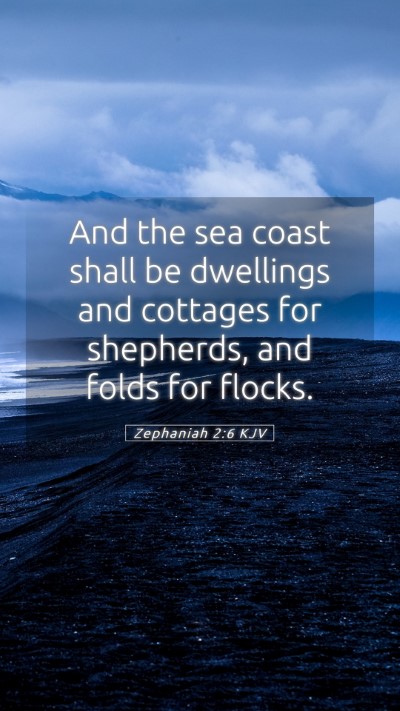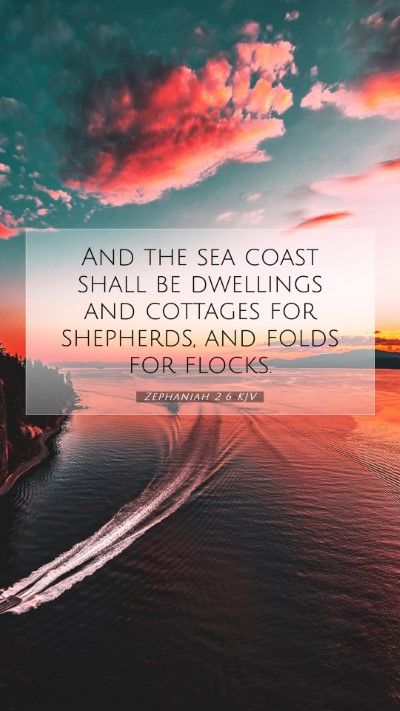Old Testament
Genesis Exodus Leviticus Numbers Deuteronomy Joshua Judges Ruth 1 Samuel 2 Samuel 1 Kings 2 Kings 1 Chronicles 2 Chronicles Ezra Nehemiah Esther Job Psalms Proverbs Ecclesiastes Song of Solomon Isaiah Jeremiah Lamentations Ezekiel Daniel Hosea Joel Amos Obadiah Jonah Micah Nahum Habakkuk Zephaniah Haggai Zechariah MalachiZephaniah 2:6 Meaning
What is the meaning of Zephaniah 2:6?
And the sea coast shall be dwellings and cottages for shepherds, and folds for flocks.
Zephaniah 2:6 Bible Verse Meaning
Understanding Zephaniah 2:6
Verse: Zephaniah 2:6 states, "And the sea coast shall be dwellings and cottages for shepherds and folds for flocks." This verse is a prophetic declaration concerning the restoration and transformation of lands once desolate.
Overview: To comprehend the meaning of Zephaniah 2:6, we must consider its context and implications within the broader themes of hope, restoration, and divine judgment found in the Book of Zephaniah.
Commentary Insights:
-
Matthew Henry:
Henry suggests that this prophecy signifies a future time when the coastlands, previously associated with destruction and desolation, will experience a revival. The imagery of shepherds and their flocks evokes a sense of peace and prosperity restored to the land.
-
Albert Barnes:
Barnes emphasizes the idea of divine favor returning to the land. He notes that the phrase "dwellings and cottages" reflects not just physical restoration but also the return of God’s people to a rightful standing with Him, marking a community where the faithful can live in harmony.
-
Adam Clarke:
Clarke interprets this verse as highlighting the shift from desolation to flourishing life. He explores the relevance of shepherding, a role synonymous with care, indicating that under God’s providence, the people will thrive, abundant with resources and support.
Historical Context
The Book of Zephaniah is set against a backdrop of impending judgment due to Israel's disobedience. This particular verse introduces a contrasting theme of hope and restoration amidst the prophesied destruction. The imagery used paints a vivid picture of a future where desolate lands will become places of security and vigor.
Thematic Elements
- Restoration: The transformation of desolate areas into homes signifies God’s power to restore what was lost.
- Divine Providence: The reference to shepherds and flocks indicates God’s protective care over His people.
- Community: The idea of shared dwellings hints at the communal aspects of faith and life among the restored people.
Application of the Verse
The application of Zephaniah 2:6 in modern life encourages believers to trust in God’s ability to bring restoration even in seemingly hopeless situations. This verse serves as a reminder that God can transform desolation into abundance, echoing His promises of redemption and hope.
Related Bible Cross References
- Isaiah 35:1-2 - A prophecy of blooming gardens and rejoicing in the wilderness.
- Ezekiel 34:14 - God’s promise to provide pastures for His flock.
- Psalms 23:1 - "The Lord is my shepherd; I shall not want."
Conclusion
In summary, Zephaniah 2:6 encapsulates a profound message of hope and renewal. Through a deep Bible verse analysis and interpretation of the various commentaries, we can see how this verse speaks to both the historical context and its applicability in our daily lives as we seek Bible study insights and understanding of Scripture.
For those engaging in online Bible study or seeking Bible study tools, this verse serves as a wonderful illustration of the powerful themes of restoration and divine care intricately woven throughout the Bible.


